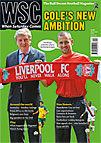 A World Cup post-mortem full of recrimination, sulking, blame and self-doubt. Sound familiar? Mike Ticher reports
A World Cup post-mortem full of recrimination, sulking, blame and self-doubt. Sound familiar? Mike Ticher reports
Picking over the World Cup carcass in Australia is still a fairly new experience, but after the excitement of competing in South Africa the questions remain wearyingly familiar. What are our realistic ambitions? How can we reconcile the interests of the national team with those of overseas-based players and a weak domestic league? What country should the coach come from? And how is Harry’s groin?
Amazingly, the last one is not yet officially irrelevant, though it should have been crossed out for good months before the tournament, when it became clear Kewell’s latest injury was not as trivial as first suggested. The tedious saga that ended with Kewell’s 24-minute cameo against Ghana would have wrapped up an era with neat symbolism if the players he left on the field had crumbled. Instead, the team written off as too old, too slow, too defensive and too inflexible after a 4-0 hiding by Germany retrieved enough respect in the remaining games to make judgments more ambiguous.
Australia are still not quite sure where they fit in world football. After the 2006 euphoria, many expected them to run before they could walk. Realistically, they should be comparing themselves with other countries outside Europe and South America that have developed economies but underdeveloped football. That means primarily the US, Japan and South Korea, all of whom went one round further in South Africa.
Those three share two other characteristics that Australia can only aspire to: they have hosted the World Cup and they have excellent homegrown coaches. Australia will find out in December if they are the chosen ones for 2022. That decision will have a huge influence, even if it does not quite determine “our children’s future” as the ever-excitable Craig Foster put it. Success would raise the intensity of every battle within soccer and against its rival domestic codes. One is over the style the national team should play and which country, if any, Australia should follow until its own coaching is up to scratch.
Here, at least, the 2010 performance offered some solid clues. Most of the players rallied round Pim Verbeek after the tournament (Brett Emerton went as far as “exceptional”), but the media and many fans rounded on the Dutchman for his odd tactics against Germany and cautious approach against Ghana and Serbia until it was almost too late. The infatuation with Dutch methods is surely over.
More telling than the tactical debate was Verbeek’s failure to promote the wider health of the game in Australia. He openly disparaged the A-League, suggesting players were better off playing in the reserves for European clubs. In the middle of the tournament he gave an interview to a Dutch magazine in which he grumbled about players, sniffily comparing his resources with Joachim Löw’s: “Look at who he can bring in without making his team weaker. And look at my reserve bench. [Nikita] Rukavytsya was not good enough for FC Twente and I have to put him on because of a lack of better alternatives.” But what did he expect?
The success of New Zealand, with their A-League coach, A-League players and unmistakeable team spirit, was an uncomfortable reminder of a more modest but effective way of doing things. Whoever Australia’s next coach is, he has to be more ambitious and less arrogant. He cannot be satisfied just by beating Bahrain 1-0. Australian soccer is still fragile – it needs technical and psychological support at all levels. The national coach cannot do everything, but he should at least take an interest in the local problems and make encouraging noises.
The same goes for the old guard of players, above all Kewell, whose resentment of criticism broke into the open in South Africa. He showed no appreciation for the notion of a fearless independent media by telling hostile Australian journalists that: “Youse are all supposed to be on our team.” After the tournament Kewell maintained that “no one is talking about retirement”, but in Australia pretty much everyone was, and not just for him. Others who have been away a long time, such as Scott Chipperfield and Vince Grella, also reacted badly to the critics, insisting they would never return to play in the A-League if that was how they were treated. Too precious by half.
The good news is Australia have less time than most to squabble and ruminate. The new coach will have less than six months before the Socceroos’ first game of the Asian Cup finals (against India, who seem to have qualified under the “everyone-gets-a-prize” rule). It’s time for some fresh faces and a bit more humility. But if Australia are the 2022 hosts, don’t be surprised to hear that they think they have a good chance of winning it.
From WSC 283 September 2010